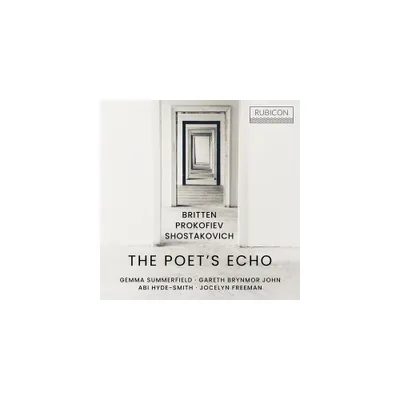Home
The Poet's Echo: Britten, Prokofiev, Shostakovich
Loading Inventory...
Barnes and Noble
The Poet's Echo: Britten, Prokofiev, Shostakovich
Current price: $23.99


Barnes and Noble
The Poet's Echo: Britten, Prokofiev, Shostakovich
Current price: $23.99
Loading Inventory...
Size: OS
*Product Information may vary - to confirm product availability, pricing, and additional information please contact Barnes and Noble
This release is one of those rare ones organized by its piano accompanist, and it is a densely constructed and absorbing piece of work. At the center is the poet
Alexander Pushkin
, whose texts are set in three of the four works on the album; the fourth, the
Shostakovich
Cello Sonata in D minor, Op. 40
, is here because pianist
Jocelyn Freeman
perceived connections between that work and the nearly contemporary
Four Pushkin Romances, Op. 46
, of the same composer. These works originated in the mid-'30s when it would have been clear to
that the grand Soviet experiment was headed south, and indeed, his settings of
Pushkin
's introspective texts are a perfect complement to the deep unease of the
Cello Sonata
. The theme of alienation and exile runs through the whole album, and it had certainly taken on new relevance by 2023, when the album was released (and made classical best-seller charts in the spring). The album's finale, which provides the title, was composed by
Benjamin Britten
for individuals who knew a lot about alienation and exile, the soprano
Galina Vishnevskaya
and her husband, cellist
Mstislav Rostropovich
; there was no cello part in the original song cycle, but the one provided by
Freeman
here seems natural enough and has the effect of plunging the listener into the creative community exemplified by the works on the program, which begins with the tense but more extroverted
Three Pushkin Romances, Op. 73
, of
Prokofiev
.
Gemma Summerfield
, who sings the
Britten
, and baritone
Gareth Brynmor John
, heard in the
songs, are not quite on the exalted level of
Vishnevskaya
, but the program holds together beautifully in
's conception, and it is reminiscent of the small gatherings where this chamber music was first heard. With
Rubicon Classics
providing excellent sound from the Wyastone Estate Concert Hall, this is a compelling recital of Russian song, even where some of it is by a non-Russian. ~ James Manheim
Alexander Pushkin
, whose texts are set in three of the four works on the album; the fourth, the
Shostakovich
Cello Sonata in D minor, Op. 40
, is here because pianist
Jocelyn Freeman
perceived connections between that work and the nearly contemporary
Four Pushkin Romances, Op. 46
, of the same composer. These works originated in the mid-'30s when it would have been clear to
that the grand Soviet experiment was headed south, and indeed, his settings of
Pushkin
's introspective texts are a perfect complement to the deep unease of the
Cello Sonata
. The theme of alienation and exile runs through the whole album, and it had certainly taken on new relevance by 2023, when the album was released (and made classical best-seller charts in the spring). The album's finale, which provides the title, was composed by
Benjamin Britten
for individuals who knew a lot about alienation and exile, the soprano
Galina Vishnevskaya
and her husband, cellist
Mstislav Rostropovich
; there was no cello part in the original song cycle, but the one provided by
Freeman
here seems natural enough and has the effect of plunging the listener into the creative community exemplified by the works on the program, which begins with the tense but more extroverted
Three Pushkin Romances, Op. 73
, of
Prokofiev
.
Gemma Summerfield
, who sings the
Britten
, and baritone
Gareth Brynmor John
, heard in the
songs, are not quite on the exalted level of
Vishnevskaya
, but the program holds together beautifully in
's conception, and it is reminiscent of the small gatherings where this chamber music was first heard. With
Rubicon Classics
providing excellent sound from the Wyastone Estate Concert Hall, this is a compelling recital of Russian song, even where some of it is by a non-Russian. ~ James Manheim


















